Art World
‘It’s Exciting to Be in a Swing State’: Why Artists Ryan Trecartin and Lizzie Fitch Moved to Ohio to Build a Rural Amusement Park
"We don't have a septic system," the artists say of the house they're building, "but it's awesome."
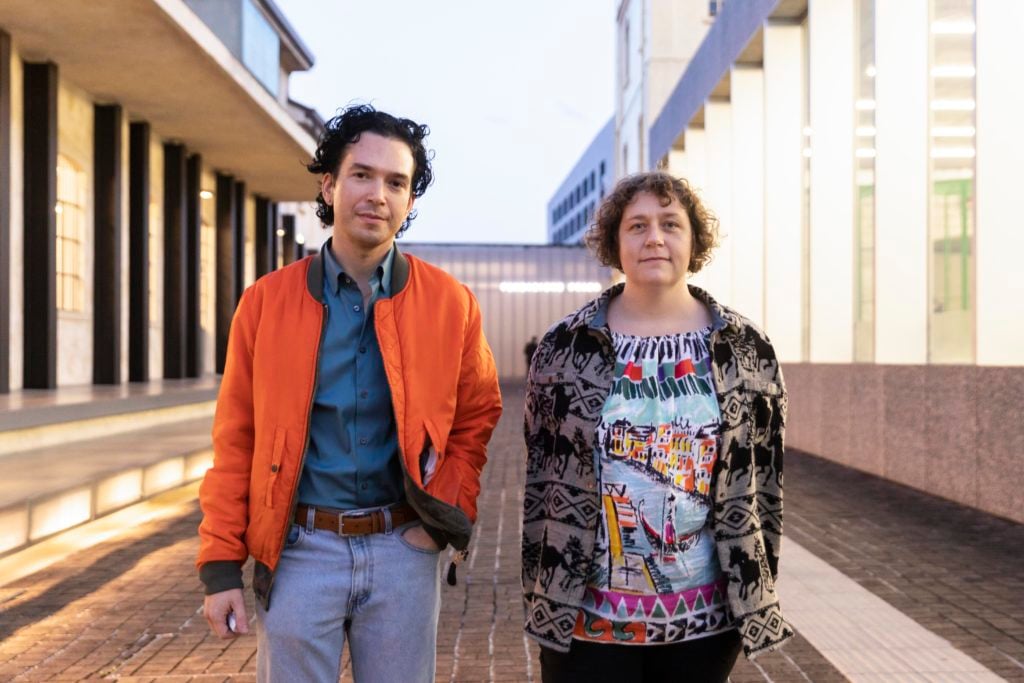
"We don't have a septic system," the artists say of the house they're building, "but it's awesome."

Scott Indrisek

Good luck concisely summarizing any of Ryan Trecartin and Lizzie Fitch’s cinematic endeavors. Their hyperkinetic video works have one thing in common: a sense of overload, both linguistic and visual, that leaves the viewer pleasantly adrift. Whether Line, the centerpiece of a new exhibition at the Fondazione Prada in Milan, is no exception. It’s a whirlwind tale of rural gentrification, Amish identity, queer dance parties, DIY real-estate projects, and what happens when Midwestern manners are confronted by surreal bad attitudes.
Before they began filming, Fitch and Trecartin relocated from Los Angeles to the town of Athens, Ohio—they both hail from the state originally—and began developing a tract of property into an ever-evolving set. They built a massive house as part of a postmodern fever dream that nonsensically Frankensteined unrelated design elements into one semi-cohesive whole. Fitch and Trecartin are now continuing to expand their land into a sort of art-damaged amusement park.
We spoke to the artists by phone from their new home—interrupted by the occasional crowing rooster—about how life in the country has affected their practice.
What are you doing for fun in Ohio?
Ryan Trecartin: It’s a super rural area, so we spend a lot of time in the woods—just walking, hanging out. My brother [Adam Trecartin] has been building a lot of paths through the woods—we live right next door to him—and a lot of friends have been visiting.
Lizzie Fitch: Going to the lake. Gardening.
Are you building things that will become part of your work?
RT: We’re building out the land as a set, or a park, so it’s becoming parts of that.
LF: But since we’ve been here we’ve been doing a lot more things that are just non-agenda-filled, in terms of a product. And even though maybe they’ll eventually be part of whatever this land becomes, it’s not like we’re building them for that reason.
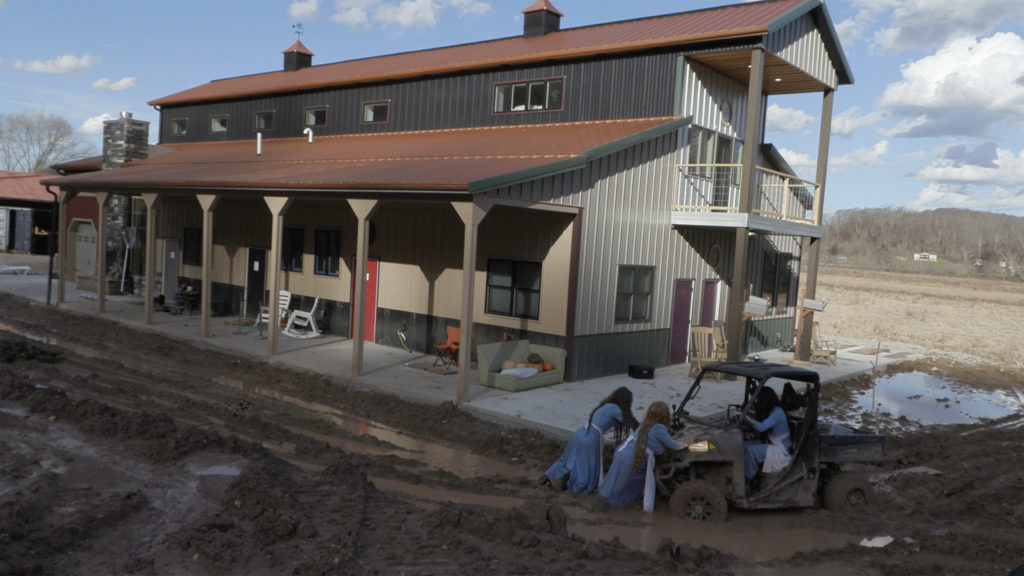
Production still from “Lizzie Fitch | Ryan Trecartin Whether Line” at Fondazione Prada. Photo: Fitch | Trecartin Studio.
What I love about Whether Line is this idea of a culture clash between all of the characters we see in the movie and their neighbors. How much of that was coming from your own experiences being there?
RT: Almost everyone we’ve met here has been incredible and very open, accepting, and curious. We do have one neighbor who’s very extreme, and he definitely inspired a lot of the content in the movie, indirectly and directly. But that’s one person in a whole community around us.
LF: Oftentimes I have these ideas in my head, assumptions [people] are going to make about us being artists—but then I end up realizing they’re just assumptions in my head, and not part of my interactions with people.
How have you described the project to locals?
RT: We say we’re making a movie. Then we jokingly say we’re making an amusement park, but it’s not really a joke, because we are. But it’s not a traditional one.
What are you losing access to by being in a rural environment, and what are you gaining?
LF: We’re kind of hermits, anyway. So even when we were living in Los Angeles—
RT: —we could have lived here. We have a lot of friends who’ve been using [the house] as a place to retreat for a couple of weeks. That happened when we lived in Miami. People would come down and spend weeks with us, and a bubble would be created for that moment. Whereas in LA everyone had a ton of reasons to go there, so the bubble was never created.
Watching the film, I was thinking of New Yorkers who have decided to move upstate and have this “back to the land” moment, despite the fact that they never came from the land. Were you considering that kind of movement, that utopian ideal?
RT: We were thinking about that a lot, in an undertone way, not as a main feature… the idea of people who have extreme mobility and access containing an area and using it for recreational purposes. And how recreation can be a decoy for more sinister things—or it could be a very exploratory, exciting, creative landscape of opportunity. The duality of all that, and the conflicts, were exciting to us.
Where do the characters in the film fall? Are they creating an exciting space, or are they gentrifiers?
RT: A lot of it doesn’t totally add up, because characters are occupying different dimensions that are in extreme contrast to each other. There’s a lot of talk about the “access class,” or being registered as a historic site, becoming a cultural feature and not being able to alter your setting or your parameters.
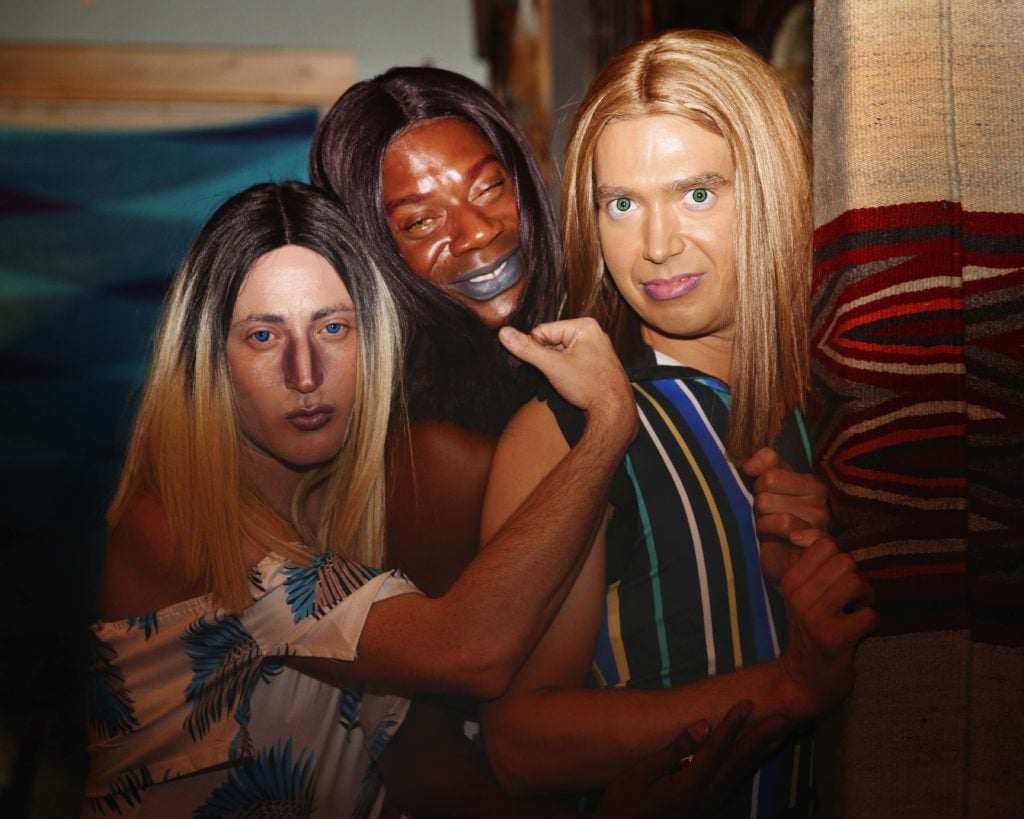
Production still from “Lizzie Fitch | Ryan Trecartin Whether Line” at Fondazione Prada. Photo: Fitch | Trecartin Studio.
Two women arrive toward the end of the film, taking pictures of the characters [and gawking like they’re on a safari].
RT: The tourists! They were supposed to represent… us. “Us” is not exactly what I mean, but people who feel a sense of access and mobility. Creative people who have proximity to a lot of things—
LF: —and who have the privilege of observing.
Do you still have that outsider-looking-in sensation?
RT: I don’t think Lizzie and I ever thought of ourselves as city people. When we lived in cities we joked around about not being city people. And then we move here, and we’re thought of as city people.
What about the film’s Amish connection? [There’s a lot of talk of characters discovering they’re “2 percent Amish.”] Other than the costumes, was there any deep dive into Amish culture?
LF: There was no deep dive.
RT: It was more exploring the cartoonification of identities. And thinking about the way people are using DNA testing now, the idea of ancestry and ownership and property as a conceptual space. We thought it was really funny for people to be finding out they were 2 percent Amish, and somehow that changes the parameters of their life. It was more of a tool, about cartoonification, than it had anything to do with actual Amishness. Even that outfit, isn’t Amish. It’s a weird Disney version of a prairie… something…
The prairie dress is coming back! It’s very on-trend. Have you guys done DNA tests yourselves?
LF: I did one. I’m 99.9 percent white.
Maybe because of the Amish connection, when I was watching Whether Line I was thinking of reality shows—like the one about Mormon sister wives.
RT: There were certain symptoms of reality TV that were present in our thinking. Particularly peoples’ new relationship to acting, and also the fear of acting. If you’re acting a role or a story that’s not yours—can you act that story? Should you be performing at all times? Are you allowed to perform something other than yourself? [Years ago, if we asked] non-actors if they would be in a movie, people who we just met or didn’t know, it’d be like “Hell yeah! I want to be in the movie!” And now it’s like: “What’s the context? Where’s it going to show? What’s the meaning?” Everyone has a relationship to their mediated self. There’s a fear a lot of people have, of context being weaponized. People are more wary. I think there’s way more anxiety around cameras than there was just five years ago.
Watching your work, it always seems like everyone involved is having a lot of fun. As if it’s all a big, sprawling, unwieldy party. Is that accurate? Or can it also be regimented, and dictatorial, and not fun in some ways?
RT: It really depends on the scene. Some are hard and painful and everyone’s working really hard and doing every line 25 times, and it looks way funner than it is. And there are other scenes that are really, really fun to shoot. It also depends on how we decide to direct the script. Sometimes it’s line-by-line, very formal, and other times we take the script as a suggestion. There’s an agenda to it, [but] there’s a lot of space for improv and invention and for people to add content and ideas. Those shoots are usually a lot more fun.
What’s more important: the acting or the editing?
RT: I don’t even know. It always switches.
LF: I would say editing is the most intensive.
RT: The writing and the editing is the hardest.
Can editing rejuvenate a flat scene?
RT: For sure. Even just with pacing. You leave some actors at a natural speed and then others you might speed up 10 percent. All of a sudden the two pacings work together, whereas before they seemed like they were happening in completely different realms. Or shortening the space between words by speeding up a tiny bit of time between two waveforms—it can really change a performance. Cropping, cutting away. I actually did less of that in this movie because I was really into getting awkward moments that people had with the camera, where they weren’t looking in the right place or when they were breaking character. But normally I do hide that stuff.
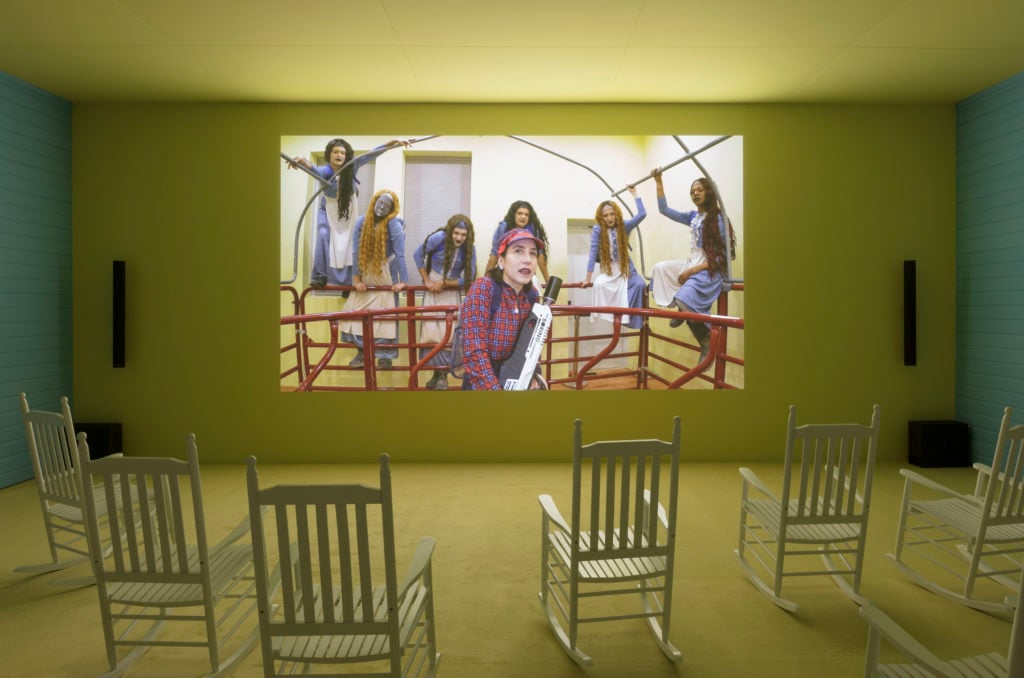
Installation view, “Lizzie Fitch | Ryan Trecartin: Whether Line” at Fondazione Prada, 2019. Photo: Andrea Rossetti, courtesy Fondazione Prada.
There’s a lot of discussion in the film about how people hate stories and plots, as if they’re tacky. Walking into Whether Line, should people be expecting a story they’re going to figure out? Or should they just let it wash over them, the language and the action, without really worrying about what’s happening?
RT: The story comes together in recollection, in recall. It’s not necessarily a thread that gets followed in a direct way. It gets pieced together in memory. But the whole rejection of stories is more about narratives as mini-prisons—
LF: —and power tools. We’re encountering this all the time now: you create a thread to follow and it can be super powerful for people…
RT: And it doesn’t necessarily mean that it’s true. I mean, stupidly, what is even ‘true’? The characters in the movie are more interested in moments that they can abandon, rather than a thread.
You’re talking about a thread in the sense of a conspiracy or a narrative about the way the world works?
RT: Yeah. Or like a policy, an ideology, a rhetoric.
LF: Those things are really useful a lot of time, obviously. How could anything change without them? But then they also become confining.
Do you mean politically, in a way people have of understanding what’s going on in the country?
LF: Yeah. You encounter it a lot in identity politics. Forming a certain political agenda around an identity, getting that kind of visibility, is really important for a lot of [people]—having a clear sort of picture of what it is helps people recognize it, helps people be able to make sort of decisions. But then…
RT: With queerness… there isn’t one way to be queer. Sometimes you get into conversations where it starts to seem like there’s rules. And those rules are important for understanding peoples’ perspectives, but then you can feel like you’re not a part of it—even though you are.
So an aversion to plot is locked into an aversion to being locked into one way of being?
RT: It’s an aversion to being defined by others. Everyone wants to be special and different in some way. I feel like most people think they don’t fit into categories. And that’s exciting.
A story might be a cliche, preordained: You know where it’s going. And speaking of truth, and stories people tell themselves about the world—is it Trump country where you are in Ohio?
LF: The city of Athens is a university town. So we’re in a really particular place.
RT: But we’re surrounded by Trump country.
LF: It’s in the air, it’s hanging.
RT: It’s exciting to be in a swing state right now. It’s like a microcosm of the energy that’s projected in the news. You’re not in a bubble. You’re seeing many different viewpoints inhabiting the same space, and people are loud about it. In LA a Trump supporter would hide.
Has it made you more open-minded, or is there a dialogue that you might not have in a city?
LF: You have to co-exist. But people are increasingly defensive about their political position in a way that is difficult sometimes.
RT: It’s different to be confronting it more, and also confronting our own stereotypes of where we grew up—and realizing that a lot of our ideas about where we grew up are wrong… I’m excited to be a voter here, though.
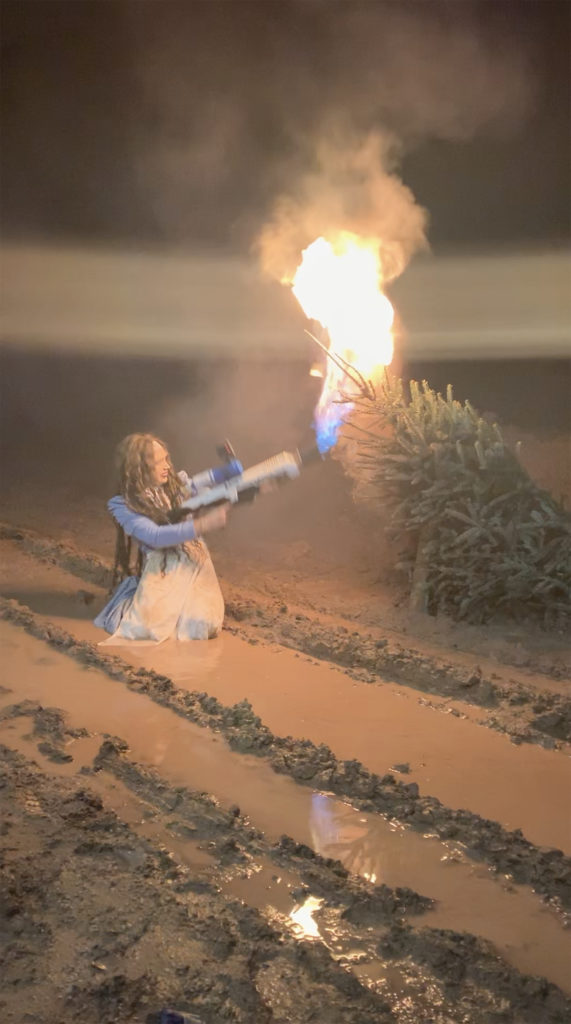
Production still from “Lizzie Fitch | Ryan Trecartin Whether Line” at Fondazione Prada. Photo: Fitch | Trecartin Studio.
I was trying to guess which actors in Whether Line may have been people you met locally. What about the guy who we see wearing two baseball hats at once, one of which says “Captain”?
RT: His name’s Jason Rankin. He was a huge part of the project, he worked on all the builds. We met him through my brother; he was born and raised here. He became an important part of our lives here. He actually helped organize some shoots and some scenes. We got to do things that we never would have been able to do if we didn’t know him. Me and him shot some scenes that are going to be in another movie; his character is basically a tour guide, he shows people around the region. We had a script about milk… he was going to bring me to one of his friend’s farms and spray me with milk from the cow’s udders. But then we couldn’t because of the health rules.
Why can’t you get sprayed with milk?
LF: The milk has to go straight from the udders into a pasteurization machine. If you do something in between those steps you contaminate everything.
RT: I guess it was something that they used to do 10 years ago?
As a pastime?
RT: I think they did it once as a prank.
I’m sorry it didn’t work out.
RT: Maybe it will, still.
LF: We have to go to a different dairy.
Where there’s a will, there’s a way. You two have worked together for so long, it’s clear that you have a certain mind-meld. Are there things that you still have productive arguments about?
LF: Most of our conversations are arguments.
RT: That’s what makes it fun.
One thing I really enjoy about Whether Line is this idea of turning cliches inside out. Two that I remember particularly are “It happens to the rest of us” and “I’ll see it when I believe it.” What’s interesting about taking well-worn language and fucking with it?
RT: I love doing that. You re-ignite the original cliche and you hear why it even became a cliche—and then the other form gains so much content and meaning from where it’s jumping off from, the shoulders it’s standing on. It can really get an idea across in multiple forms in one take.
LF: And “I’ll see it when I believe it” is so this moment. Everyone’s waiting to believe first, and then they’ll see what they want to see.
What’s the strangest thing that happened during the production of Whether Line?
LF: This isn’t the strangest, but one day our yard flipped into the building we were building.
RT: We had a landslide, a mudslide. There was an unprecedented rainfall, and none of the builds were done in the way that we originally envisioned, because of extreme weather delays. Farmers were even getting FEMA money. I showed up at the house and Lizzie [and others] were digging [out] our building with their hands. Now we have a retaining wall, because of that.
The house you made [combines wildly different styles and features into one]. How crazy does it feel to be inside it?
RT: I’m about to move in. We don’t have a septic system. I can’t believe I’m not going to have any water. But it is awesome. It’s so cool. It’s where everyone will stay who’s visiting, and it’ll also be our studio.
So much of the film is about finding a perfect place to settle. Do you think this might be it for you guys?
RT: This is the first time we’ve ever owned anything.
LF: We’re definitely not going to sell it. And I personally am exhausted right now, so I’m not going anywhere fast.
RT: I love living here. We’ll probably go somewhere, maybe move somewhere for a year to do our next project, but we’re going to continue to add to this and build it out. This body of work just started.
Well, you found your dream home, for the moment.
RT: We did. We totally did.